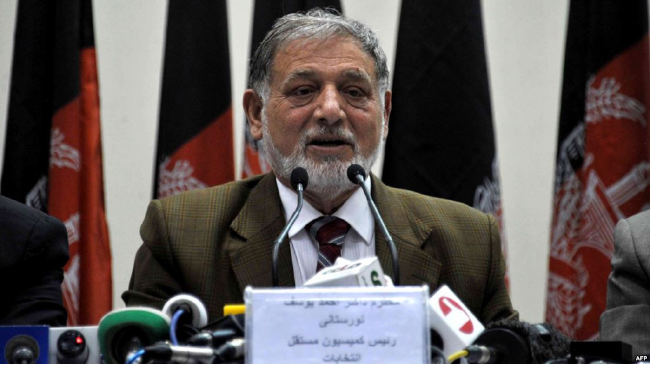With the electoral reforms in a stalemate, concerns are growing over the fate of the reform process and the upcoming parliamentary and provincial council elections. Government officials have said that President Ashraf Ghani would soon issue a second decree on the electoral reforms before the end of the MPs’ winter recess. Other reports suggest the government has been engaged in talks with members of the parliament to secure support of the MPs before the decree goes to the lower house of representatives. The news come as the fate of the electoral reforms process remains uncertain given the legal stalemate created after the lower house of the parliament, the Wolesi Jirga, rejected two presidential decrees over the reforms.
Despite the announcements, it is not yet clear whether the government would be able to make a breakthrough in the reforms process and fulfill its commitment on reforming the country’s electoral system and governing bodies. The main challenge for delivering the electoral reforms seems to be lack of commitment and political will in the higher tiers of the government rather than the parliament’s blockade of the reforms process. The government has failed to lead an effective reform process. It has fallen short of exploring every possible way for getting the reforms process through the bureaucratic and legal procedures. The efforts have been lagging behind the expected timeline for delivering the reforms while the reforms are a vital prerequisite to the future parliamentary election.
The timeline and arrangements for holding the upcoming parliamentary and provincial council elections are messy. While government officials continuously insisting on its commitment to make the reforms, there are conflicts going on over arrangements and timeline of the upcoming elections. With uncertainties hovering over the electoral reforms, officials of the Independent Election Commissions do not miss the opportunity to make use of the chaos and insist on their own election agenda. Earlier the head of the IEC announced a date for the parliamentary election which was rebuffed by authorities of the Chief Executive Office. The IEC is viewed as an incompetent and its move to set the date of the upcoming elections are considered as incredible and unbinding. The government’s lack of action to find a way forward for making the reforms is going to further complicate the situation. If the trend continues, the failures would build up and in turn result to failure of the parliamentary and the provincial council elections. Without the promise reforms, the legitimacy of the upcoming parliamentary election would again be marred by cheatings, controversies and behind-door dealings. The government needs to learn from the problematic presidential elections held in 2014. The current national unity government is a product of political dealings between two key major camps that contested in the 2014 elections. Electoral reforms were a key foundation of the agreement that led to the formation of the unity government. There is a need to prevent the repetition of vote which pushed the country into the brink of an abyss.
The news over the government’s efforts to make consensus with the lawmakers over the reforms and the relevant presidential decree is promising. However, much more needed to be done to end the political wrangling. The inconsistencies in activities of the relevant commissions and government offices must end and relevant agencies need to be aligned with the reform process. The leaders of the government need to join efforts to make agreements over this and direct all other groups to abide by the reforms process. The government agencies and commissions involved in the process such as the electoral reforms commission, the two electoral commissions and the selection committees are needed to remain on the same page under a unified government policy of electoral reforms.
In addition, broader consensuses are needed over the electoral reforms, the upcoming elections and the overall political developments in the country. Political divisions undermine the government’s efforts to lead the country’s political development, stabilize the country and implement programs for improving the economy. The government needs to lead an initiative to bring all political actors on board and garner their support. After a recent remark by an American official, there were chats in the media of possible political breakdown in the country due to the growing rifts over key national issues including the controversial electoral reforms. Such environment in the politics and the media would potentially harm the state’s credibility and sustainability against existing challenges. The politicians and the leaders of the government need to realize the intensity and dimensions of the potentially undermining situation.
There is no clear roadmap for delivering the reforms and making preparations for the next parliamentary and provincial council elections. The protracted efforts have already harmed the process of the electoral reforms. Since getting underway, the reform process has been involved with repeated delays, blame games and controversies. This needs to be prevented. The government needs to lead the reforms based on a holding and efficient timeline. The process has been stalled many times since it started, and there is no guarantee it would not be stopped again amidst the controversies. Policy makers need to redouble efforts and agree on a clear roadmap for the whole process.
The legal stalemate over the electoral reforms will be resolved if the government works closely with the MPs and persuade them to approve the laws or endorse the presidential decrees. The government needs to lead a more robust lobby for passing the reform agenda from the parliament. As the MPs are in their winter recess, there is also the possibility for the government to issue a decree over the reforms process. The electoral reforms are imperative for a sound, transparent and fraud-free parliamentary election. The government should end the uncertainties and lead the process out of the stalemate.
Home » Opinion » The Uncertainties over the Electoral Reforms
The Uncertainties over the Electoral Reforms
| Abdul Ahad Bahrami

